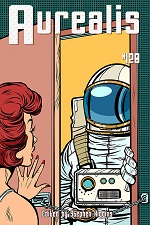“Of Roses and Electric Shock” by Joshua Caleb Wilson
Reviewed by Victoria Silverwolf
The latest issue of this Australian publication offers near future science fiction with a satiric edge, tongue-in-cheek fantasy adventure with a hardboiled narrator, and space opera with the feeling of a horror story.
In “Of Roses and Electric Shock” by Joshua Caleb Wilson, a business executive working hard to earn an important promotion has an experimental robot duplicate made of herself. The machine not only performs household chores; it also serves as a sex partner for her husband, without his knowledge of the substitution. The company that produced the prototype plans to release multiple copies of it to the public, still in the woman’s image. The ensuing complications play havoc with her life, leading to desperate action.
The plot serves as an effective allegory of the way in which society often judges a woman by her appearance rather than by her ability. In most ways, the author creates a convincing, detailed future world of highly advanced technology. The robot itself, however, strains credibility, particularly in the way the husband is unable to tell the difference between it and his wife. Even for a satire, this weakens the story’s impact.
The narrator of “To Hell and Back” by Michael Pryor is a demon, living on Earth in human form. A chaotic reorganization of Hell allows its rulers to drag living people, whether they deserve punishment or not, into the infernal realm to face eternal torture. The narrator’s job is to rescue these unfortunate souls. The story begins when an extremely wealthy woman hires the demon to bring back her husband. The task proves to be a daunting one, not only because of the many dangers of Hell, but also due to the husband’s peculiar attitude towards his horrible situation.
The story is told in the manner of a traditional hardboiled detective story, with a sarcastic, wisecracking, tough-as-nails narrator. He has the usual beautiful female assistant, also a demon, although she plays a very small part. Many readers will appreciate the dry comic tone and imaginative descriptions of Hell, but there are few surprises in the plot.
“Timbuktu” by Gerri Brightwell takes place on a remote world that has important mineral deposits. Decades before the story begins, surveyors seeded the planet with a huge number of tiny biological machines designed to eliminate all native life, and then die off themselves. A follow-up team takes samples of what remains, in order to prove that nothing survives. In particular, the possibility of a so-called Mother Beast remaining, in the form of a single, vast mechanism derived from the smaller machines, makes the job a dangerous one. The truth turns out to be even more frightening.
The author creates a strong sense of claustrophobia, as the main character slogs through endless tracts of sand and rock in a heavy spacesuit, his vision limited by constant sandstorms. The threat of a Mother Beast, although this turns out to be a red herring, creates suspense. Near the end, the story changes point of view, with a disorienting effect. The plot makes this narrative shift unavoidable, but it lessens the intended horror of the final scene.
Victoria Silverwolf has all the cats back from the vet now.
 Aurealis #120, May 2019
Aurealis #120, May 2019